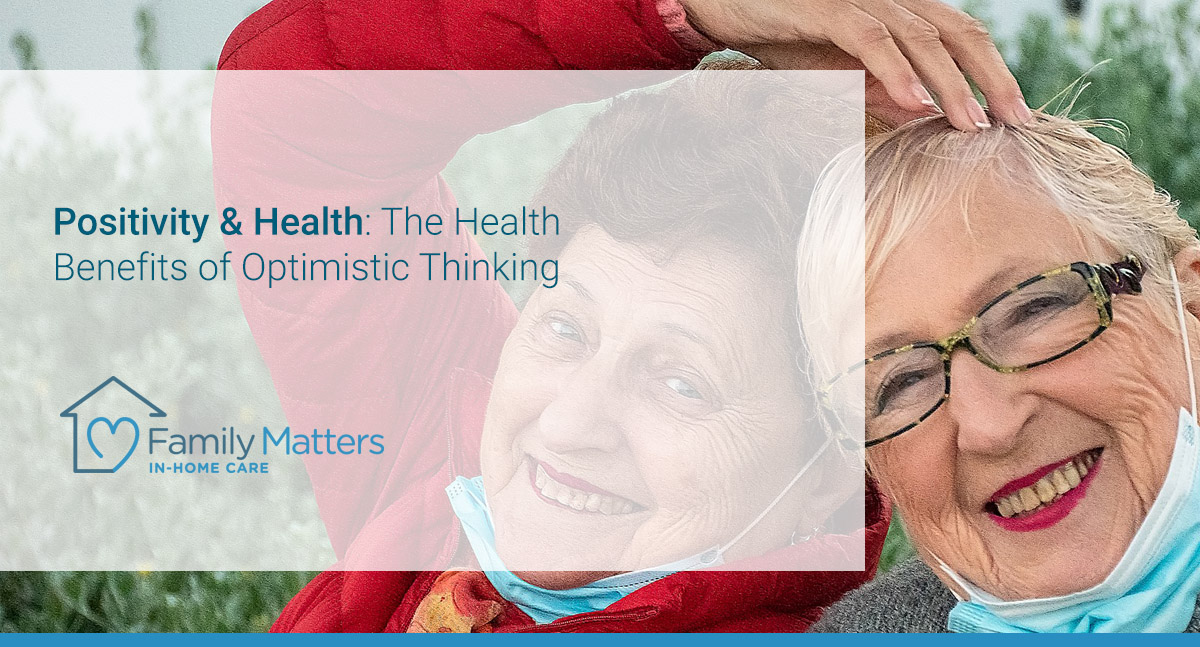
Positivity & Health: The Health Benefits of Optimistic Thinking
Our minds are powerful tools for creating health and wellness. While studies haven’t identified precisely why positive people are healthier, researchers suspect that it is because people who are more positive process stress better and move through hard situations more easily.
Negative attitudes and feelings of helplessness can create chronic stress, which can, in turn, damage the immune system. Anger and hostility are related to health conditions such as high blood pressure, cardiovascular disease, digestive disorders, and increased instances of infection
Surprisingly, the tendency toward a positive or negative outlook does have a genetic component. However, this doesn’t mean that people can’t improve their outlooks. Some tips to improve your outlook include:
- Smile more. Even fake smiling can reduce heart rate and blood pressure during stressful situations.
- Practice reframing. Instead of stressing about a current situation, try to find a positive aspect to it.
- Build resiliency. Having friends and family nearby to share the situation with, accepting that change is a part of life and finding new ways to adapt, and feeling like you have the control to change the current situation are all ways to embrace whatever life throws your way.
- Share your feelings. Often, we spend too much time in our heads. Sharing our feelings with a trusted other can help find a different way to look at a situation. If others are mired in their current negative situations, encourage them to share their fears.
Tips for Creating a More Positive Outlook
- Get better sleep.
- Take a walk outside.
- Follow a healthy lifestyle.
- Practice positive self-talk.
- Surround yourself with positive people.
- Be open to humor or create a place for smiling and laughing every day.
- Consciously work on experiencing three positive emotions for every negative one.
- Actively evaluate your self-talk at various points during the day to see how you’re doing.
While loved ones might resist the idea of optimistic thinking, there are health reasons to ask them to reconsider. Positive thinking can lead to:
- Better sleep
- Increased life span
- Lower levels of distress
- Lower rates of depression
- Greater resistance to the common cold
- Better cardiovascular health
- Better coping skills during extreme hardship
Are you a negative or positive thinker?
Listen to your own self-talk – that endless stream of unspoken thoughts that goes through your head. Some forms of negative self-talk to watch out for include:
- Filtering. This means magnifying the negative aspects of a situation and not acknowledging the positive. For example: Your loved one had a good night’s sleep, a fun phone call with their grandchild, and took a walk on a beautifully sunny day outside. But then they tripped and fell with minor injuries. At the end of the day, did they say it was a “bad” day because of the fall or a “good” day because of the rest?
- Personalizing. When something bad occurs, you or your loved one automatically takes the blame. Sometimes no one is to blame.
- Catastrophizing. You or your loved one uses language that makes things out to be much worse than they are, or assumes that because one bad thing happened, it’s all downhill from there. Single events in the day are rarely the “worst” or “most horrific.”
- Polarizing. You or your loved one sees things as either good or bad and not the huge gray area in the middle. This leads to feeling like one is only perfect or a failure; healthy or dying tomorrow; capable or completely incapacitated.
Positive Self-Talk
- Affirm daily what is good about you.
- Remove the words “never” and “always.”
- Express gratitude – either aloud or in your head.
- If you make a mistake, take a moment to forgive yourself.
- Don’t say anything to yourself that you wouldn’t say to someone else.
If you or your family member is considering in-home care as part of a plan to age in place, contact Family Matters In-Home Care today for a free consultation. Our team is dedicated to supporting your family and helping older adults enjoy life in the comfort of their own home for as long as possible.
Some of the services offered by Family Matter In-Home Care include: Alzheimer’s & Dementia Care, Bed & Wheelchair Transfer Assistance, Companionship, Housekeeping & Meal Preparation, Personal Care, Recovery Care, and Transportation.
Serving the San Francisco Bay Area and Greater San Diego, Family Matter In-Home Care has offices throughout California including: Campbell, CA, Roseville, CA, San Marcos, CA, and San Mateo, CA.
Sources:
- https://f.hubspotusercontent30.net/hubfs/1708580/Marketing%20Monthlies/PDFs/0421-MM-Positivity.pdf
- https://www.hopkinsmedicine.org/health/wellness-and-prevention/the-power-of-positive-thinking
- https://www.takingcharge.csh.umn.edu/how-do-thoughts-and-emotions-affect-health
- https://www.uwhealth.org/health-wellness/the-happiness-ripple-effect/50784
- https://www.mayoclinic.org/healthy-lifestyle/stress-management/in-depth/positive-thinking/art-20043950
